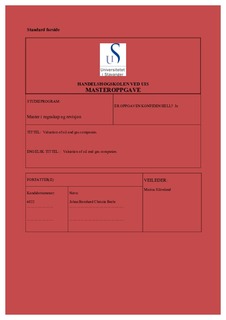Valuation of oil and gas companies
Master thesis
Permanent lenke
http://hdl.handle.net/11250/2564259Utgivelsesdato
2018-05Metadata
Vis full innførselSamlinger
- Studentoppgaver (Business) [1035]
Sammendrag
The purpose of this thesis is to look at the effect on corporate valuation associated with the choice of accounting method. Drilling companies1 have two available accounting methods for the exploration and development cost of oil wells: full cost accounting and successful efforts accounting. To investigate the differences both earnings response coefficient and value relevance analysis is used in this paper. The earnings response coefficient analysis is based on research by Gabrielsen, Garmlich & Plenborg (2002), Bandyopadhyay (1994) and Holthausen & Verrecchia (1988). The value relevance analysis is based on the methodology of Ohlson (1995) and previous research by Midsund, Osmundsen & Sikveland (2015).
This paper contributes to existing literature because it includes new variables to better highlight the differences in the two accounting methods. Both analyses are run on data from 1991-2015 and subsets based on oil prices. The period between 2002 and 2007 is defined as the oil boom, 1991-2001 as pre-boom and 2008-2015 as post boom. The findings from the earnings response coefficient analysis are consistent with pervious research. I observe a similar adjusted r2 and the variables react to the changes in oil price in the same way Bandyopadhyay observes. The findings from the earnings response coefficient analysis are also inline with previous research, with a adjusted r2 to the one Misund, Osmundsen & Sikveland find. I observe some differences in significance, which is likely due to stricter robustness tests.
New findings come from the inclusion of variables not previously investigated in the literature. These variables are based on drilling success rate. In the earnings response coefficient- and the value relevance model I find that higher drilling success rate is indicative of a higher return for full cost companies and insignificant for successful efforts companies. This is as expected based on the two accounting methods. I also include a change in drilling success rate has an explanatory variable. By analyzing change in drilling success rate I find that improving drilling success rate is indicative of higher returns for successful efforts companies in the value relevance analysis, but insignificant for full cost companies, and insignificant in the earnings response coefficient analysis. This is expected if current information is handled correctly in the market valuation, but previous information is misunderstood. I further include an explanatory variable based on the historic diversion from 100% drilling success rate. I observe a lower return for full cost companies in both analysis, but positive results for successful efforts companies. This is surprising because previous years drilling success is known information and should not impact the expected stock return in a later period.
The findings imply that analysts are able incorporate current information adequately, but unable to correctly assess how drilling success rate is accrued in the financial statements. The drilling success rate has not been analyzed in previous research, therefore these findings add new information to the field and the results suggest that it should play an important role in the further discussions on full cost and successful efforts accounting.
Beskrivelse
Master's thesis in Accounting and auditing

